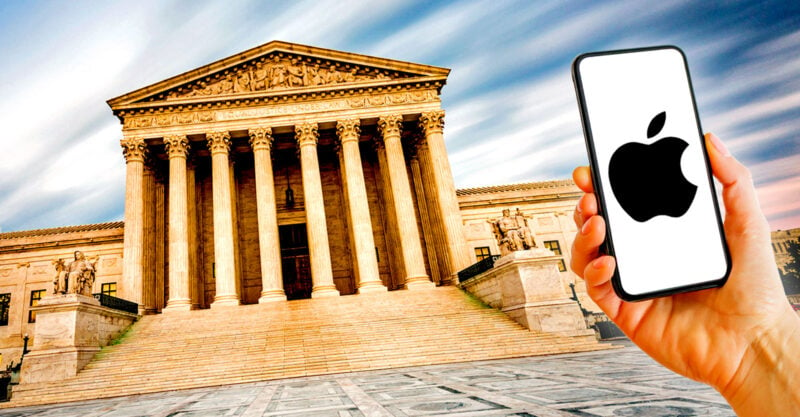CHD Asks U.S. Supreme Court to Rule in Cellphone Radiation Case Against Apple
Children’s Health Defense and eight nonprofits on Wednesday filed an amicus brief in support of plaintiffs in a lawsuit against Apple. The plaintiffs are asking the U.S. Supreme court to decide if the Federal Communication Commission’s cellphone radiation guidelines preempt state safety and health laws.
Miss a day, miss a lot. Subscribe to The Defender's Top News of the Day. It's free.
Children’s Health Defense (CHD) and eight nonprofits on Wednesday filed an amicus brief in support of plaintiffs in a lawsuit against Apple.
The plaintiffs are asking the U.S. Supreme Court to decide if the Federal Communication Commission’s (FCC) cellphone radiation guidelines preempt state safety and health laws.
According to the plaintiffs, this question has been “left unresolved for more than a decade” — allowing telecommunication companies like Apple to avoid facing personal injury claims from cellphone users who allege the company violated state health and safety law by failing to inform consumers of the health risks associated with the radiofrequency (RF) radiation emitted by the phones.
“The telecom equipment industry, just like Big Pharma, thinks it should be free to inflict great harm on individuals and then force taxpayers and the rest of society to bear the cost,” said Mary Holland, Children’s Health Defense president and general counsel.
Holland, who also is the counsel of record for the amicus brief, said telecom companies like Apple are “horrified” at the thought of facing a jury that might hold them accountable for their negligence — “the historical means by which giant corporations have been constrained into responsible behavior.”
W. Scott McCollough — lead litigator on behalf of CHD’s electromagnetic radiation (EMR)-related legal work and a co-author of CHD’s brief — said the Supreme Court should “reject the wireless companies’ plea for immunity and allow justice to be served through the jury system, just like our founders intended.”
An amicus brief is filed by non-parties to a litigation to provide information that has bearing on the issues and to assist the court in reaching the correct decision. It comes from the Latin words amicus curiae, which means “friend of the court.”
Appeals court decision ‘threatens to radically empower courts and federal agencies to displace state law’
The plaintiffs in Andrew Cohen et al. v. Apple Inc., et al sued Apple in October 2020, alleging Apple’s iPhone emitted RF radiation that regularly exceeded the federal exposure limit and that Apple violated state health and safety law by failing to warn consumers about the health and safety risks of holding the device close to the body.
However, the U.S. Court of Appeals for the 9th Circuit on Aug. 26, 2022, ruled the plaintiffs’ claims were invalid because the FCC’s federal guidance “impliedly preempted” state health and safety law.
The plaintiffs responded by filing a petition for a writ of certiorari — or “cert” request — asking the Supreme Court to hear the case.
According to the petition, the 9th Circuit made “inference upon inference” in its ruling and the Supreme Court has the opportunity to “set things right” by clarifying that unelected federal bureaucrats cannot override state health and safety law.
The petition said:
“Left to stand, the [9th Circuit’s] decision below threatens to radically empower courts and federal agencies to displace state law — and to ignore Congress’s intent in doing so.”
Moreover, the 9th Circuit’s decision contradicts other courts’ decisions, the plaintiffs said.
For instance, the 4th Circuit ruled in 2005 that the FCC’s guidelines set
“only a regulatory floor, not a ceiling — meaning that state-law health-and-safety claims did not conflict with the regulation’s purposes or objectives at all,” the plaintiffs wrote.
Wireless companies want to be ‘free of potential or actual liability’
In its brief, CHD supported the plaintiffs’ argument, pointing out the FCC has “expressly refused” to preempt state law over consumer devices on several occasions when members of the telecommunications industry asked the FCC to step in and eliminate people’s rights.
A rule-making administration process exists for the purpose of establishing such preemption — and the FCC has chosen not to complete that process regarding its personal electronic devices policy, CHD said.
According to McCollough, a former Texas assistant attorney general and telecom and administrative law attorney, the real issue is that Apple — “and by extension all other wireless device equipment manufactures and vendors, whether cellphones or things like Wi-Fi routers” — want to be “completely free of potential or actual liability for the damage they cause to people and the environment.”
McCollough said:
“They contend that the mere act of registering the equipment with the FCC immunizes them from state law remedies for physical or other injuries resulting from the RF/EMR exposure or even things like fires started by the internal battery … even though the FCC has repeatedly refused to preempt state law judicial remedies and there is no alternative forum that provides recompense.”
Apple has until April 14, 2023, to respond. After that, the nation’s highest court will decide whether or not to hear the case.

